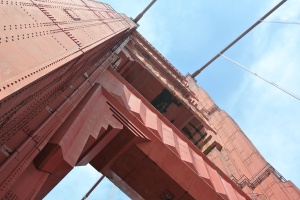So last week was my first experience of an international conference – the Urban Affairs Association annual conference, which took place in San Francisco. In fact, this was my first experience of presenting at a conference outside of my own university, so quite a leap there (Sheffield may be a city of hills, but even steel city’s steep climbs have nothing on San Francisco. Of course, the conference took place at the summit of one of these hills). As per the previous post, I was there to talk about social media in cultural events, and was hoping to get some useful feedback and advice, as well as attending some training and forcing myself into a situation where, by dint of being the only member of my department attending the conference, I had to ‘network’ (that’ll be ‘make conversation’ then).
 What follows is a number of musings on this experience, which will perhaps be helpful to others heading out to conferences for the first time. After all, this seems to be another in the long line of activities expected of you during the course of a PhD that nobody ever really explains to you.
What follows is a number of musings on this experience, which will perhaps be helpful to others heading out to conferences for the first time. After all, this seems to be another in the long line of activities expected of you during the course of a PhD that nobody ever really explains to you.
- Postgrad training days are an excellent way of opening a conference. I’m not sure how common this is (this was the first year the UAA had offered such training), but I came away from this day of workshops feeling better prepared for some of the challenges that a PhD (and my post-PhD future) will throw at me. It also had the added bonus of offering an informal situation in which to meet other conference attenders, whether postgraduate students, academics or publishers, before the general chaos of the full conference began.
- No matter how many hours/weeks/months you have spent on your conference paper, it is likely that your panel moderator will be the only one to read it. My supervisors had warned me that people don’t always submit full papers, even where these are requested, and that spending a lot of time on said paper is probably more useful for the PhD than it is for the conference. Even having taken this on board, it was a little disheartening to only give out two copies of a paper that I had spent many weeks preparing. I suppose the advice here is to think about the skills or knowledge you’ve developed through researching and writing that paper, rather than worrying about the impact it’s had on others.
- Given that most people won’t read your paper, prepare your presentation well ahead of time! One of the most useful pointers given at the ‘Professional and Career Development Workshop’ I attended on day one of the UAA conference was to take the time to really rehearse your presentation. Condensing a 6,000 odd word paper into 15 minutes can be tricky, and upon hearing this advice from Kathe Newman (accompanied by an anecdote about her first presentation at the UAA, which, she believed, went horribly wrong) I went home, and whilst it was too late to rewrite my slides, I paid far closer attention to what exactly I was going to say the next day. The UAA is an incredibly broad conference, with ‘urban’ being the only common theme. Working out how to tell the ‘story’ of your paper in a way that is both sufficiently explanatory and also interesting to a varied audience is not exactly a breeze. In a way I wish I had heard this advice further ahead of my presentation – my tendency is to fret over writing style and other issues relating to the paper, and then assume that the form of a presentation will somehow become apparent from this process – but even over one evening, I probably had the chance to improve the quality of what I was presenting.
- Try not to judge yourself too much by the performances of others. That paper on music scenes in Montreal was really interesting. She must have done a far better job than me. And those people explained their theoretical bases in a sophisticated manner I feel I’ll never achieve. And the guy who talked about the corporatisation of Vice magazine was really engaging, without the need for powerpoint or anything. What I’m trying to do now is work out what pointers I can gain from these experiences, rather than using them to dismantle my own presentation. It’s all about personal and professional development, and at this early stage you will remember far more about your presentation than anybody else will.
All in all, am I glad I went? Yes. No matter how many times I wonder whether I made the most of my paper, whether I made any lasting contacts, whether I spoke to enough people or summarised my research effectively, this was definitely part of the PhD learning curve. The UAA kindly funded my conference fees (as I presented in their ‘Gene Burd Track on Media and Urban Life’), and this was also the first time they included a grad school training programme in the conference (the cost of which was included in the standard fees). Even with funding from The University of Sheffield – which paid for part of my flight – it was still expensive, and to an extent it seemed like the conference was a chance for an already-developed network of academics to catch up with one another, whereas my future interests lie predominantly outside of the university setting. Even taking this into consideration, however, I’m pleased to have crossed this hurdle, and done so without falling.
